-
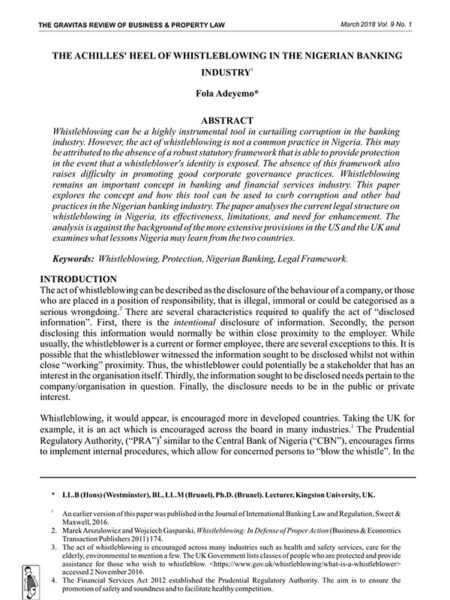
The Achilles’ Heel of Whistleblowing in the Nigerian Banking Industry
0₦2,500.00Dr. Fola Adeyemo, Lecturer, Kingston University UK in her paper, “The Achilles’ Heel of Whistleblowing in the Nigerian Banking Industry”,laments the absence of a robust statutory framework for protection of whistleblowers in Nigeria. She analyses the current legal structure on whistleblowing in Nigeria with emphasis on the banking industry. The analysis is against the background of the more extensive provisions in the US and the UK. She concludes with the lessons Nigeria can learn from the two countries.
-
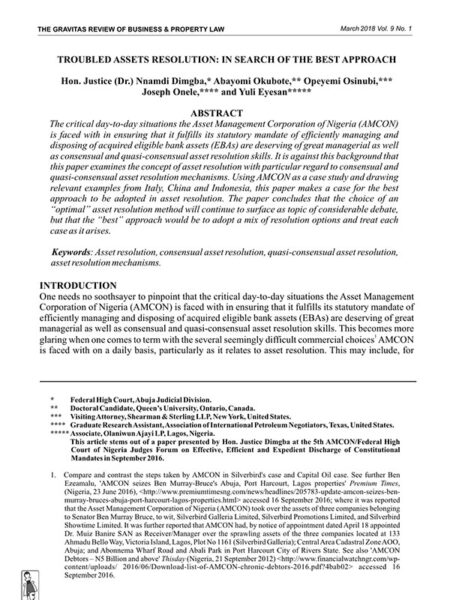
Troubled Assets Resolution in Search of the Best Approach
0₦2,500.00Hon. Justice (Dr) Nnamdi Dimgba of the Federal High Court Abuja, and the quartet of Abayomi Okubote, Opeyemi Osinubi, Joseph Onele and Yuli Eyesan in their paper, “Troubled Assets Resolution-In Search of the Best Approach”,examine the concept of asset resolution with particular regard to consensual and quasi-consensual resolution mechanisms. Using AMCON as a case study, and analysing its mandate to manage and dispose of acquired eligible banks assets (EBAs), and drawing relevant examples from Italy, China and Indonesia, they consider adversarial recovery methods, and non-adversarial consensual or quasi-consensual resolution options by which the ‘toxic assets bank’ may fulfill its mandate. They conclude that the “best” approach would be to adopt a mix of resolution options and treat each case as it arises.
-
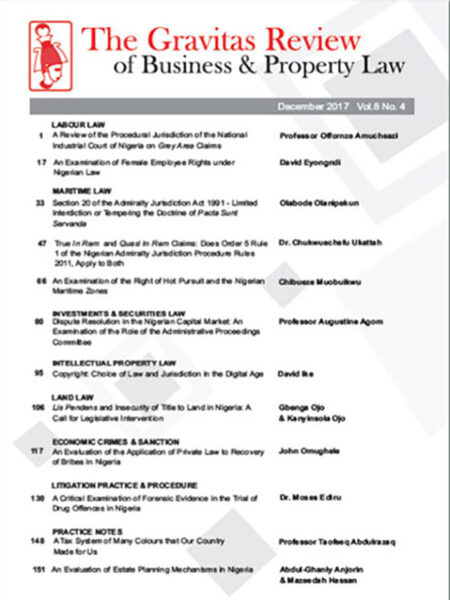
The Gravitas Review of Business & Property Law Vol.8 No.4 – Print
0₦5,000.00In this issue of The Gravitas Review of Business & Property Law Vol.8 No.4, there are well researched articles on:
- Labour Law
- Maritime Law
- Investments & Securities Law
- Intellectual Property Law
- Land Law
- Economic Crimes & Sanction
- Litigation Practice & Procedure
- Practice Notes
-

The Gravitas Review of Business & Property Law Vol.8 No.4 – E-Book
0₦5,000.00In this issue of The Gravitas Review of Business & Property Law Vol.8 No.4, there are well researched articles on:
- Labour Law
- Maritime Law
- Investments & Securities Law
- Intellectual Property Law
- Land Law
- Economic Crimes & Sanction
- Litigation Practice & Procedure
- Practice Notes
-

The Gravitas Review of Business & Property Law Vol.8 No.4
0₦5,000.00In this issue of The Gravitas Review of Business & Property Law Vol.8 No.4, there are well researched articles on:
- Labour Law
- Maritime Law
- Investments & Securities Law
- Intellectual Property Law
- Land Law
- Economic Crimes & Sanction
- Litigation Practice & Procedure
- Practice Notes
-
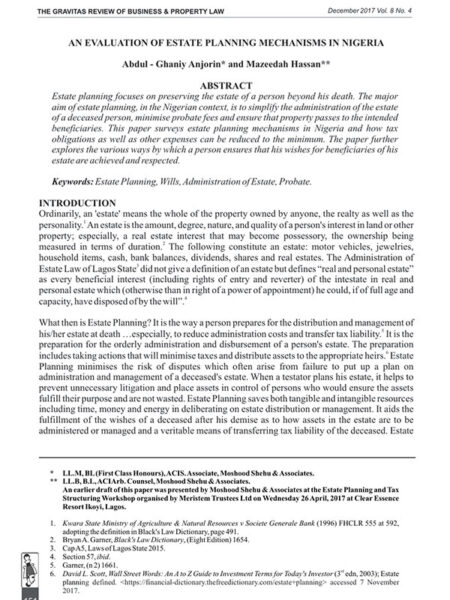
An Evaluation of Estate Planning Mechanisms in Nigeria
0₦2,500.00Despite the repeal of the Capital Transfer Tax Act 1979, some states, including Lagos, continue to charge a variant of inheritance tax called “Estate Duty”, before grant of probate or letters of administration in respect of a deceased person’s estate. Against this background, Abdul-Ghaniy Anjorin and Mazeedah Hassan, Legal Practitioners, in their paper, “An Evaluation of Estate Planning Mechanisms in Nigeria”, examine various estate planning devices that may be employed by an estate owner to simplify the administration of his estate, minimise probate fees, and ensure a seamless intergenerational transfer of assets.
-
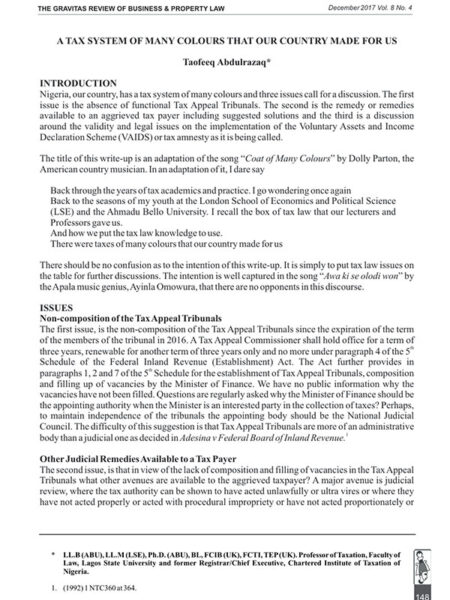
A Tax System of Many Colours that Our Country has Made for Us
0₦2,500.00Professor Taofeeq Abdulrazaq, Tax Partner, Nolands Nigeria Professional Services, waxes lyrical in “A Tax System of Many Colours that Our Country Made for Us”. He examines the legal status and validity of the Voluntary Assets and Income Declaration Scheme (VAIDS) and extra-statutory concessions, generally. He explores other judicial remedies available to a tax payer in light of the non-composition of the Tax Appeal Tribunals, and concludes that “conclusions are meaningless in a state of flux”.
-
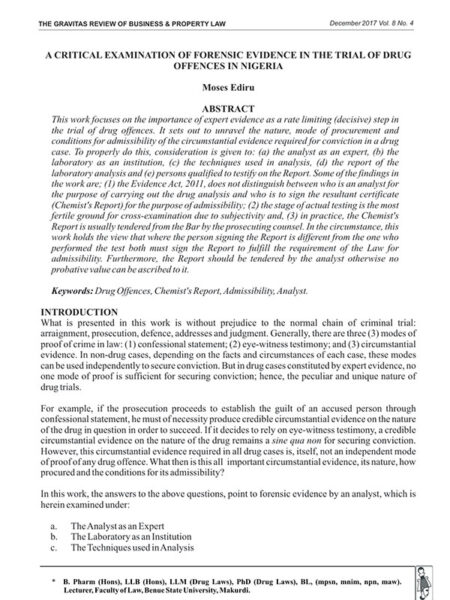
A Critical Examination of Forensic Evidence in the Trial of Drug Offences in Nigeria
0₦2,500.00Dr. Moses Ediru of the Benue State University, Makurdi, in his article, “A Critical Examination of Forensic Evidence in the Trial of Drug Offences in Nigeria”, unravels the nature , mode of procurement, and conditions for admissibility of circumstantial evidence required for conviction in a drug case. He considers salient evidential issues that should engage the attention of counsel in trial of drug offences including the role of the analyst as an expert, the laboratory as an institution, the techniques used in analysis, the report of the laboratory analysis, and persons qualified to testify on the Report.
-
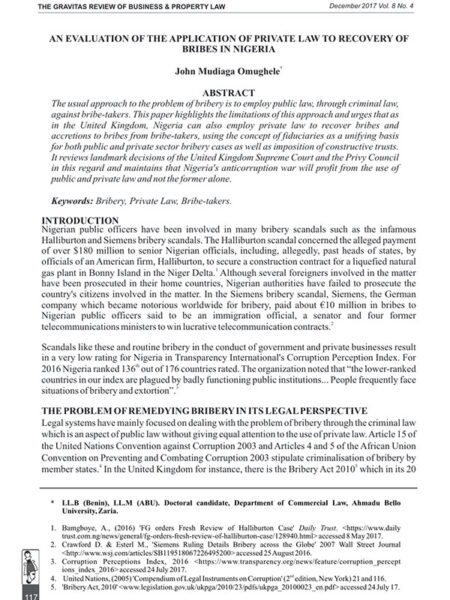
An Evaluation of the Application of Private Law to Recovery of Bribes in Nigeria
0₦2,500.00John Omughele, Legal Practitioner and researcher, in his article, “An Evaluation of the Application of Private Law to Recovery of Bribes in Nigeria”, notes that the usual approach to the problem of bribery is to employ public law, through criminal law, against bribe-takers. He highlights the limitations of this approach and argues that as in the United Kingdom, Nigeria can also employ private law to recover bribes and accretions to bribes from bribe-takers, using the concept of fiduciaries as a unifying basis for both public and private sector bribery cases, as well as imposition of constructive trusts.
-
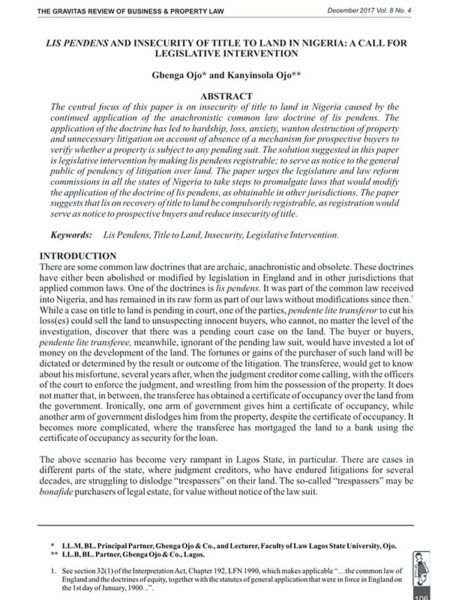
Lis Pendens and Insecurity of Title to Land in Nigeria: A Call for Legislative Intervention
0₦2,500.00Is a sale transaction pendente lite void or voidable? Gbenga Ojo, Lecturer, Lagos State University, and Kanyinsola Ojo, Partner, Gbenga Ojo & Co, in their engaging article, “Lis Pendens and Insecurity of Title to Land in Nigeria: A Call for Legislative Intervention”, review Supreme Court decisions on the nature of title transferred during litigation. They argue that the legal immunity given to a bona fide purchaser for value without notice, and the indefeasibility of title conferred on a purchaser under the (repealed) Registration of Title Law (now replaced by the Land Registration Law of Lagos State, 2015) will not avail a purchaser pendente lite. They call for compulsory registration of pending litigations on land, as done in some other jurisdictions, to serve as notice to prospective buyers, and reduce insecurity of title.
-
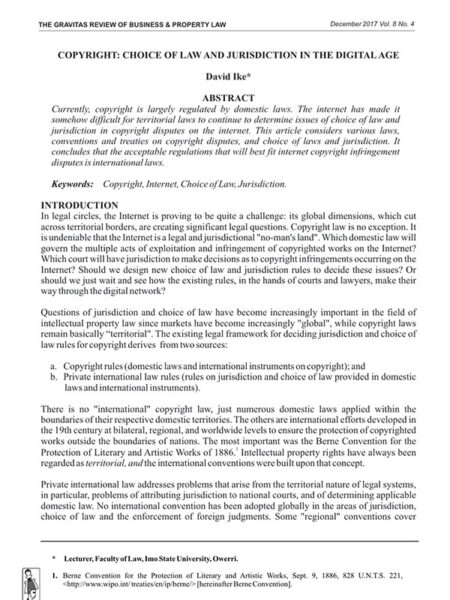
Copyright Choice of Law and Jurisdiction in the Digital Age
0₦2,500.00David Ike of the Imo State University in his article, “Copyright: Choice of Law and Jurisdiction in The Digital Age”, argues that the internet is a legal and jurisdictional “no-man’s land”. He reviews international conventions and treaties on copyright disputes, and concludes that the existing legal framework for deciding jurisdiction and choice of law rules (domestic laws and international instruments on copyright, and private international law rules), are ill-fitted to respond to the needs of copyright infringement on the internet.
-
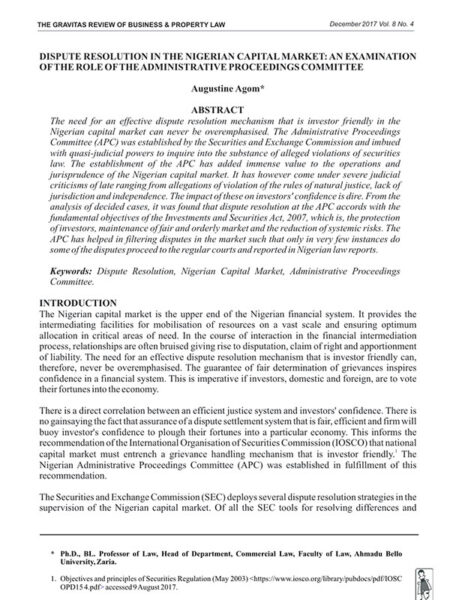
Dispute Resolution in the Nigerian Capital Market: An Examination of the Role of the Administration Proceedings Committee
0₦2,500.00Professor Augustine Agom, Head of Department, Commercial Law Ahmadu Bello University, Zaria in his article, “Dispute Resolution in the Nigerian Capital Market: An Examination of the Role of the Administrative Proceedings Committee”, considers the role of the Administrative Proceedings Committee in the resolution of disputes, its creation, constitution, and procedure. He tackles the criticisms against the Committee especially the allegations of determination of issues with elements of crime, and of violation of fair hearing by the Committee due to the all-pervading influence of the Securities and Exchange Commission.
The Gravitas Review of Business & Property Law



